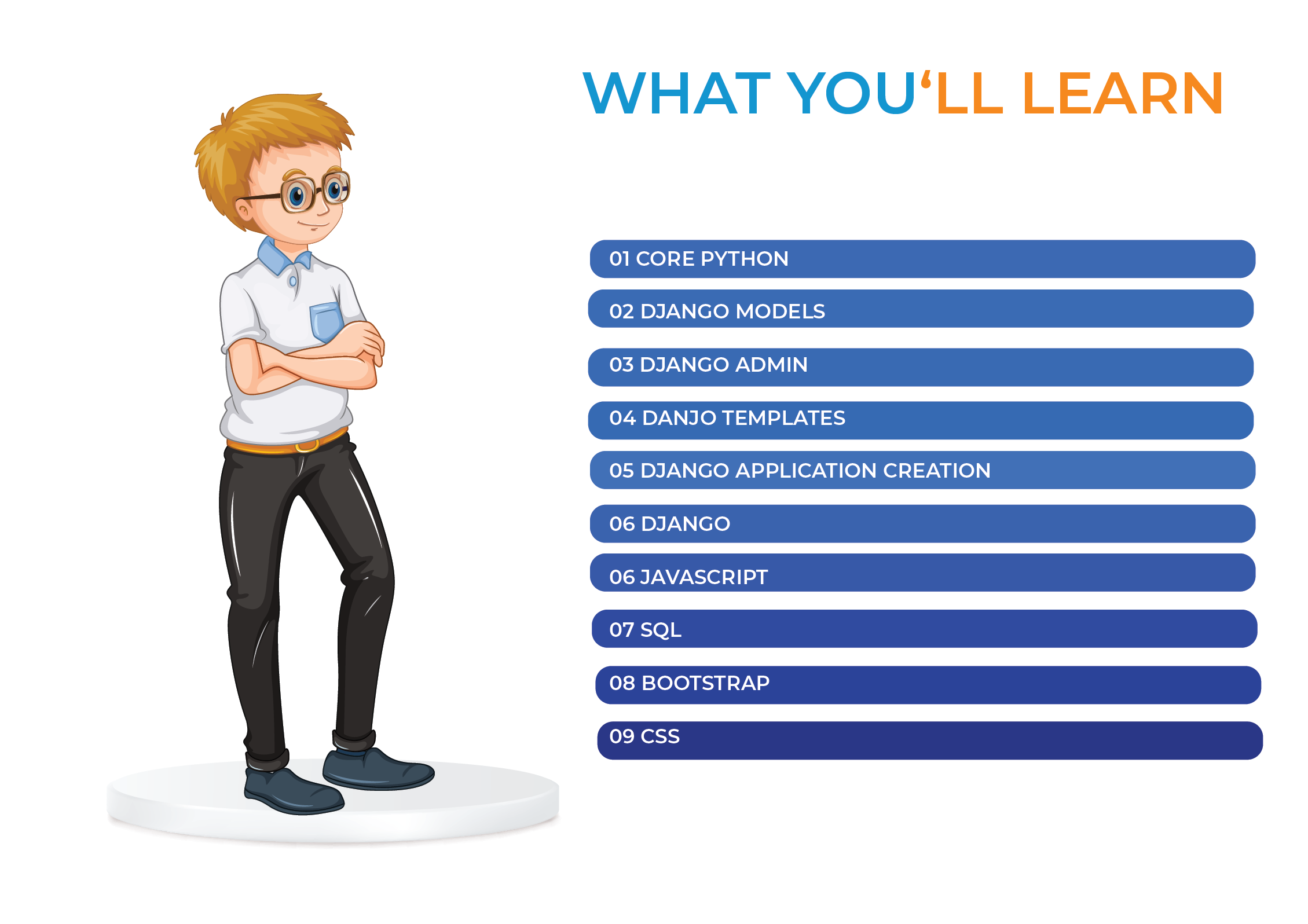PYTHON FULL STACK DEVELOPRER
Datasparklearning provides best Software Testing Specialist Training with 100% Job Placement assistance. Get trained from industry experts & start your IT career.
What You Will Learn
Dataspark learning – Software Training Institute
CORE PYTHON
- Introduction to Python
What is Python-Why Python? -History-Applications -Features of Python Advantages Versions of Python-Installation – Compar isons b/w various programming languages C, Java and Python
- Operations
Python Modes of Execution-Interactive mode of Execution-Batch mode of Execution- Editors and IDEs- Data Types, Constants, Variables and Comments-Es cape Sequences, String indices and slicing
- Operators
Logical, Arithmetic, Comparison, As signment Operators-Shorthand As signment OperatorsBitwise, Membershipand Identity Operators
- Different types of IDE’s
Pycharm IDE Installation, Working with Pycharm, Components-Installing Anaconda, What is Conda? Anaconda Prompt,Anaconda Navigator, Jupyter Notebook, Jupyter Features, Spyder IDE, Spyder Features, Conda and PIP
- Control Statements
Indentation in Python- Block/clause-Conditional Statements (if statement,if…else statement, if…elif…statement)
- Looping Statements
for loop- while loop,- while… else,-RangeQ in for loop- Nested for loop- Break statementContinue statement- Pass statement
- Python Strings
Creating, indexing, slicing, Concatenation of String- String Comparison, splitting and joiningFinding SubStrings- String Case Change- Split strings- String methods
- Python Collections
Introduction Lists, Tuples, Sets, Dictionaries -Operations on collections – Functions for collections – Methods of collection – Nested collections – Differences b/w list tuple and set and Dictionary
- Lists
Properties Creation indexing and slicing – List Operations – Nested Lists – List Modification, List insertion and deletion List Methods
- Tuples
Properties, Creation, indexing and slicing- Tuple Operations, Nested Tuples, Tuple MethodsDifferences b/w List and Tuple
- Sets
Properties, Creation and Operations on Set- Mathematical Operations -Set Methods, Insertion and Deletion operation
- Dictionary
Properties, Creation, Operations on Dictionary- Insertion and Deletion of elements- Differences b/w list tuple and set and Dictionary
- Functions
Defining a function – Calling a function – Properties and Examples of Functions – Categories of Functions – Argument types – Variable Length – Arguments Variables –Passing collections to function Local and Global variables- Recursive Function functions to function Anonymous or Lambda function – Filter() and map Q functions
- Modules
Module definition- types of module-User defined module- Setting path- The import statementNormal Import- From … Import- Module Aliases- Dir function- Working with Standard modules – Math,Random, Date time and os modules,
- Packages
Definition for packages-Importing from packages , –init–.py file- Defining sub packagesImporting from sub packages
- Errors & Exception Handling
Types of errors, Run-Time Errors, Compile-Time Errors, What is an Exception?-Use of Exception handling-Predefined Exceptions- Try, Except, finally blocks- Nested blocks- Dealing with Multiple Exceptions-User defined Exceptions-Raise statement
- File Handling
Introduction-Different Types of Files in Python-File Opening-file Closing- Writing data to filesTell() and seek() methods-Reading a data from file- Appending data to files-With open stmtVarious functions
- OOPs Concepts
OOPs Significance- Class-Object- Ab straction – Encapsulation – Static and non static variablesDefining methods-Difference between functions & methods-Constructors -Built -in attri butesObject Reference count-Destructor-Inheritance-Types of Inheritances-PolymorphismOverriding- Super() statement
- Regular Expressions
Regular expression – Special characters- Formation of regular expression- Compiling regular expressions- Grouping- Match() function- Search() function-Matching vs searching- Replacing text – Splitting a string-Validations
- Database Access
Basics-Installing database-Creation of database users – Installing database Python modules connection withdatabase- SQL queries-Retrieving data from Database- SQL queries Transaction Management-Handling with errors
- Python Date and Time
Use Date & DateTime Class- Calendar in Python – Time and date Objects – Time and calendar Modules
- Operating System Module
Introduction-Getcwd-Listdir-Chdir-Mk dir-rename file/dir-remove file/dir-Os help-Os operations
WEB DEVELOPMENT
HTML
Introduction to WEB-Basic Tags- Formatting Tags-Lists-Tables-Images-Anchors-Forms-Input Elements-Form Attributes-Frames-GET/POST-Drag/ Drop-Canvas-Multimedia
CSS
Introduction-Syntaxes-Styling,-Styling Links,-Styling Lists-Styling Backgrounds-Styling Fonts,- Styling Tables-Borders-Selectors- Fonts-Text Effects-Backgrounds-keyframes Rule-Multiple Columns-2D Transforms-3D Transforms-Transitions Animations- User Interface
BOOTSTRAP
Introduction-Images-Tables-Forms-Dropdowns- Buttons-Button Groups-Helper Classes- PanelsAlerts-Panels-Plugins Overview
SQL
Introduction-Installing a Database- Creating database- Creating Tables- Deletion-InsertionUpdation- Groupings and Aggregations-Eliminating Duplicates-Ordering- Filtering-Merging tables-Horizontal Merging- Vertical Merging-Types of Joins-Various Built-in Functions-working with queries
JAVASCRIPT
Introduction for JavaScript-Comments and Types of Comments-Popup Boxes- Variables & Operators-JavaScript Functions and Events-Conditional Statements-Looping Control Statements-Types of Errors-Exception Handling-Java Script Objects-Browser ObjectsValidations in JS
DJANGO
INTRODUCTION and WEB FRAMEWORKS
Definition and Advantages-Features -Characteristics -Difference b/w MVC and MVTModels Views and Templates-What is a Web Framework? -Server-HTTP Requests and HTTP Responses-web framework -web application- Steps in Developing a web application.
DJANGO PROJECT ARCHITECTURE
Django Architecture-Django Installation-Virtual Environment-Working with Pycharm-Working with ATOM-Developing First Django Application- manage.py, -urls.py settings.py, admin.py, models.py, and views.py- Application creations and Examples
DJANGO APPLICATION CREATION
Steps in Application creation-Working with views-Working with HTML and CSS-Working with Bootstrap-Django Application creation in Atom-Django Application creation in Pycharm- project with multiple Applications-Reusing a Application in different projects-Working with Staticfiles
DJANGO VIEWS
Requesting a web page through URL-Render HttpResponse to templates-Rendering web page through view function-Application with multiple views-Understanding context object and dictionary type-GET and POST methods
DJANGO TEMPLATES
Template tags-Template Filters-Template API-Passing Dynamic content to template file-Passing multiple dict values to template- Loading static files-Adding image file to template-Advanced Templates-Template library-custom template filter-custom templates tags-Registering the tags
DJANGO ADMIN
Activating the Admin interface- Creating super user for Admin site- Using the Admin site- How to use the Admin site
DJANGO MODELS
Working with models and databases-Defining Models-Model Forms-Forms Defining-Model Fields-Makemigrations and migrate-Registering models with Admin site-Registering models in settings. Py-Connecting with sqlite3, MySQL and Oracle databases Add on Topics Excel workbook- GUI Programming- advanced concepts
Python Fullstack Dovelopment
Core Python, Advanced Python, Web Development, Html, Css, Javascript, Bootstrap, Sql, Django
Python Fullstack Dovelopment
Core Python, Advanced Python, Web Development, Html, Css, Javascript, Bootstrap, Sql, Django
Duration: 6 Months, 5 Days a Week, 2 Hours/day


WHY PYTHON FULL STACK DEVELOPMENT ?
A Python Full Stack Development course is a comprehensive program that teaches students how to build web applications using Python on both the front-end and back-end. This includes learning how to use Python with popular web frameworks Django as well as front-end technologies like HTML, CSS, and JavaScript. Python with Django is a popular combination for full-stack development because Django is a powerful and flexible web framework that makes it easy to build complex applications quickly. Django comes with a lot of built-in features and tools, including an ORM (Object-Relational Mapper) for interacting with databases, a templating language for rendering HTML templates, and a powerful admin interface for managing data.
Why Data Science ?
High Demand for Data Scientists: Data science is one of the fastest growing and highest paying fields in technology, with a huge demand for skilled professionals. By studying data science, you’ll be positioning yourself for a lucrative and in-demand career.
Growing Importance of Data: In the digital age, data is increasingly being recognized as a valuable asset for organisations. Data science is the field that helps organisations extract insights from this data and use it to make informed decisions.
Interdisciplinary Nature: Data science combines elements of computer science, mathematics, and statistics, making it a truly interdisciplinary field. This interdisciplinary approach allows for a deep understanding of the many different aspects of data analysis and modelling.
In conclusion, data science is a fascinating and rapidly growing field that offers a wealth of opportunities for those who choose to study it. Whether you’re interested in a career in technology, business, or science, data science is a great choice for anyone who wants to work with data and make a difference in the world.
![40784-[Converted] datasparklearning.com](https://datasparklearning.com/wp-content/uploads/2022/12/40784-Converted.jpg)
Admission Process
There are 3 simple steps in the Admission Process which is detailed below:
01
Fill the Application Form
Apply by filling a simple online application form to kick-start the admission process.
02
Interview Process & Demo Session
Go through a screening call with Admissions office and Book your demo.
03
Join the Program
Block your seat with a payment of ₹ 1000 to begin learning with prep course.
Why should you prefer uss.
Years of experience in data science
Placement asistance
Companies
Technologies
Placements
Our mission is to provide 100% placements to students

